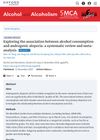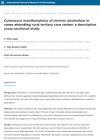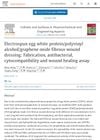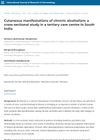 171 citations,
October 1990 in “Alcoholism/Alcoholism, clinical and experimental research”
171 citations,
October 1990 in “Alcoholism/Alcoholism, clinical and experimental research” The document concludes that the exact way alcohol causes harm to fetal development is unknown, but it significantly affects nutrient transport to the fetus and a safe level of alcohol during pregnancy is not determined.
63 citations,
April 2017 in “Acta psychiatrica Scandinavica” Higher prenatal and adult androgen levels are linked to alcohol dependence and withdrawal severity.
 27 citations,
June 2013 in “Alcoholism: Clinical and Experimental Research”
27 citations,
June 2013 in “Alcoholism: Clinical and Experimental Research” Finasteride use may lead to less alcohol consumption in men with lasting sexual side effects.
 19 citations,
January 2009 in “Journal of Young Pharmacists”
19 citations,
January 2009 in “Journal of Young Pharmacists” Alcoholic extract of Eclipta alba may help treat allergies and is safe at high doses.
14 citations,
September 2017 in “Hormones and behavior” δ-GABAA receptors affect alcohol consumption based on the estrous cycle and influence movement regardless of the cycle.
 12 citations,
January 2013 in “Alcohol and Alcoholism”
12 citations,
January 2013 in “Alcohol and Alcoholism” Alcohol in teen years leads to more adult drinking, finasteride doesn't help.
 9 citations,
February 2022 in “Biomolecules”
9 citations,
February 2022 in “Biomolecules” Drinking a lot of alcohol increases the risk of prostate cancer and can worsen the condition.
 6 citations,
December 2019 in “BMC Complementary and Alternative Medicine”
6 citations,
December 2019 in “BMC Complementary and Alternative Medicine” Alcohol extract from Vernonia anthelmintica seeds may help treat stress-related hair loss.
4 citations,
July 1948 in “Experimental biology and medicine” Alcohol extraction lowers casein's nutrition, causing slower growth and hair loss in rats.
1 citations,
April 2019 in “The Journal of urology/The journal of urology” Marijuana use is linked to higher chances of needing treatment for urinary symptoms in men over 40.
 1 citations,
January 2019 in “Elsevier eBooks”
1 citations,
January 2019 in “Elsevier eBooks” Neuroactive steroids may affect the risk and treatment of alcohol use disorders.
 September 2024 in “Alcohol and Alcoholism”
September 2024 in “Alcohol and Alcoholism” Alcohol may slightly increase the risk of hair loss, but the link is uncertain.
 February 2024 in “International Journal of Research in Dermatology”
February 2024 in “International Journal of Research in Dermatology” Alcohol-free minoxidil 5% is effective and safe for treating male pattern hair loss.

Cetosomal minoxidil is safer and as effective as alcohol-based minoxidil for male hair loss treatment.
 July 2022 in “International journal of dermatology, venereology and leprosy sciences”
July 2022 in “International journal of dermatology, venereology and leprosy sciences” More frequent and severe skin problems are linked to higher daily alcohol consumption.
 June 2021 in “International Journal of Research in Dermatology”
June 2021 in “International Journal of Research in Dermatology” Half of the people with alcohol dependency in the study had liver disease and skin issues like seborrheic dermatitis, which are important signs of alcohol abuse.
May 2019 in “Eurasian Journal of Biosciences” Fenugreek aqueous extract is more effective against acne bacteria than the alcoholic extract.
January 2023 in “International Journal of Trichology” Alcohol-free minoxidil is better for treating hair loss in Indian men.
 April 2020 in “Dermatology and therapy”
April 2020 in “Dermatology and therapy” New 5% minoxidil solution improves scalp hydration, reduces redness, and may be safer for sensitive users.
 119 citations,
November 2009 in “Human Reproduction”
119 citations,
November 2009 in “Human Reproduction” Women with PCOS and higher androgen levels are more likely to have fatty liver disease.
38 citations,
May 1971 in “Clinical genetics” A specific metabolite, not a receptor protein, triggers the production of certain kidney enzymes, but this process is disrupted in mice with a mutation causing testicular feminization.
 35 citations,
May 2015 in “Arquivos De Gastroenterologia”
35 citations,
May 2015 in “Arquivos De Gastroenterologia” Women with PCOS are more likely to have fatty liver disease and worse metabolic health.
 14 citations,
January 2020 in “Biomaterials Science”
14 citations,
January 2020 in “Biomaterials Science” Created microspheres show potential for safe and effective use in prostate artery embolization.
 10 citations,
February 2023 in “Colloids and surfaces. A, Physicochemical and engineering aspects”
10 citations,
February 2023 in “Colloids and surfaces. A, Physicochemical and engineering aspects” Adding 1 mg/ml of graphene oxide to egg white protein wound dressings improves antibacterial properties and supports skin repair.
 2 citations,
April 2022 in “African Health Sciences”
2 citations,
April 2022 in “African Health Sciences” The Fatty Liver Index (FLI) may not be enough to rule out non-alcoholic fatty liver disease in lean women with polycystic ovary syndrome.
 1 citations,
October 2016 in “International Journal of Research in Dermatology”
1 citations,
October 2016 in “International Journal of Research in Dermatology” Chronic alcoholics most commonly experience skin infections.
 January 2025 in “Regenerative Biomaterials”
January 2025 in “Regenerative Biomaterials” The hydrogel helps reduce scarring and improve wound healing by releasing salvianolic acid B in acidic conditions.
 May 2019 in “The Journal of Sexual Medicine”
May 2019 in “The Journal of Sexual Medicine” Drinking alcohol before taking flibanserin does not increase the risk of severe low blood pressure or fainting.

Pimpinella anisum L. extract significantly boosts hair growth in mice.
 November 2022 in “International Journal of General Medicine”
November 2022 in “International Journal of General Medicine” Women with Polycystic Ovary Syndrome are more likely to have Non-Alcoholic Fatty Pancreas Disease, which is associated with older age, metabolic syndrome, insulin resistance, and high male hormone levels.






















